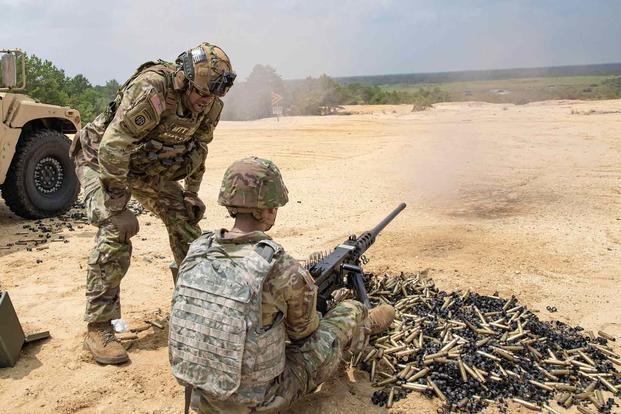Department of Veterans Affairs disability claims filed by reservists and members of the National Guard were approved at rates 11% to 20% lower across a 10-year period than those submitted by active-duty personnel across the services -- a reflection of the challenges those troops face proving that an injury or illness is related to military service, a federal watchdog agency has found.
In 2022, more than 706,000 troops were serving in the reserves or National Guard -- one-third of all members of the U.S. armed forces. As a result of their unique status, only those injured or sickened while serving on federal orders for periods of 30 days or more or reservists harmed during annual training are eligible to apply for disability compensation.
But those service members may be unaware of the importance of immediately reporting health issues resulting from activation or drills, according to a report published Monday by the Government Accountability Office. Meanwhile, the military services fall short in accurately documenting periods of service, preventing troops with the same health challenges as active-duty members from getting care and assistance, it added.
Read Next: Iraq Campaign Medal Returns Amid Surge in Drone, Rocket Attacks on US Forces There
By analyzing data provided by the VA and interviewing researchers, veterans service representatives and organizations, GAO auditors found that the department approved lower percentages of initial disability and pension claims from 2012 to 2021 for reserve members compared with active-duty troops, even as some had "similarly severe service-connected disabilities," albeit at lower numbers.
"Differences in approval rates for disability compensation appeared each year and persisted across service members' military service factors such as service branch and rank, as well as demographic factors such as race and ethnicity and sex," according to the report.
The GAO found that:
- 83% of reserve component warrant officers' claims were approved, compared with 56% of reserve junior enlisted personnel.
- Among those with wartime service, reserve component members were approved at 67% compared with 83% of active duty.
- Women were approved at lower rates than men.
- Reserve members of the Coast Guard faced the biggest percentage difference in approval ratings while the Navy had the smallest difference.
- Across ethnicities, Black reserve component claims had the lowest approval ratings, at 48%, compared with Asian (67%), Native American or Alaskan Natives (63%), Pacific Islander or Hawaiian (69%), Hispanic (67%), and white (71%).
Among the problems facing reserve and National Guard members in submitting VA claims is proving service connection, the GAO noted. Troops are expected to document their health conditions when they occur, and they must do so while on duty, to a civilian provider, or during required periodic health assessments.
This type of reporting can facilitate the member receiving a document known as a line-of-duty determination, which can help support their claims.
But according to the GAO, the line-of-duty determinations often aren't processed correctly and documents frequently are "scattered, lost or never existed."
Reserve members also may face issues accessing health care or be the targets of bias in the military health system, the analysts noted.
Or they may simply be the victims of poor recordkeeping by the Defense Department, which may not accurately document dates of service. The DoD plans to fix that problem with a new form, known as the DD-214-1, designed to more accurately record duty status data but, the GAO noted, "the services did not fully apply many sound project planning practices when planning to implement this new form" by 2025.
The GAO made 14 recommendations to the VA and Defense Department to improve data collection and help eligible reserve and National Guard members receive disability benefits they have earned.
They include that the DoD and VA upgrade guidance to members on documenting their health issues, improve implementation of the new DD-214-1, and provide VA claims processors with accurate data on training and service dates.
The departments largely agreed with the GAO recommendations and pledged to implement them, although they did not provide any targeted dates of completion.
GAO analysts urged them to act as soon as possible.
"Guidance on documenting health conditions, efficient rollout of DoD's new form, and better VA data on service dates could help reserve component members prove that their disabilities are connected to their military service. Without this proof, VA claims processors will likely deny disability compensation claims," according to the report.
-- Patricia Kime can be reached at Patricia.Kime@Military.com.
Related: Crew Shortages, Bad Mattresses Causing Navy Surface Sailors to Lose Shut-Eye, Watchdog Says












